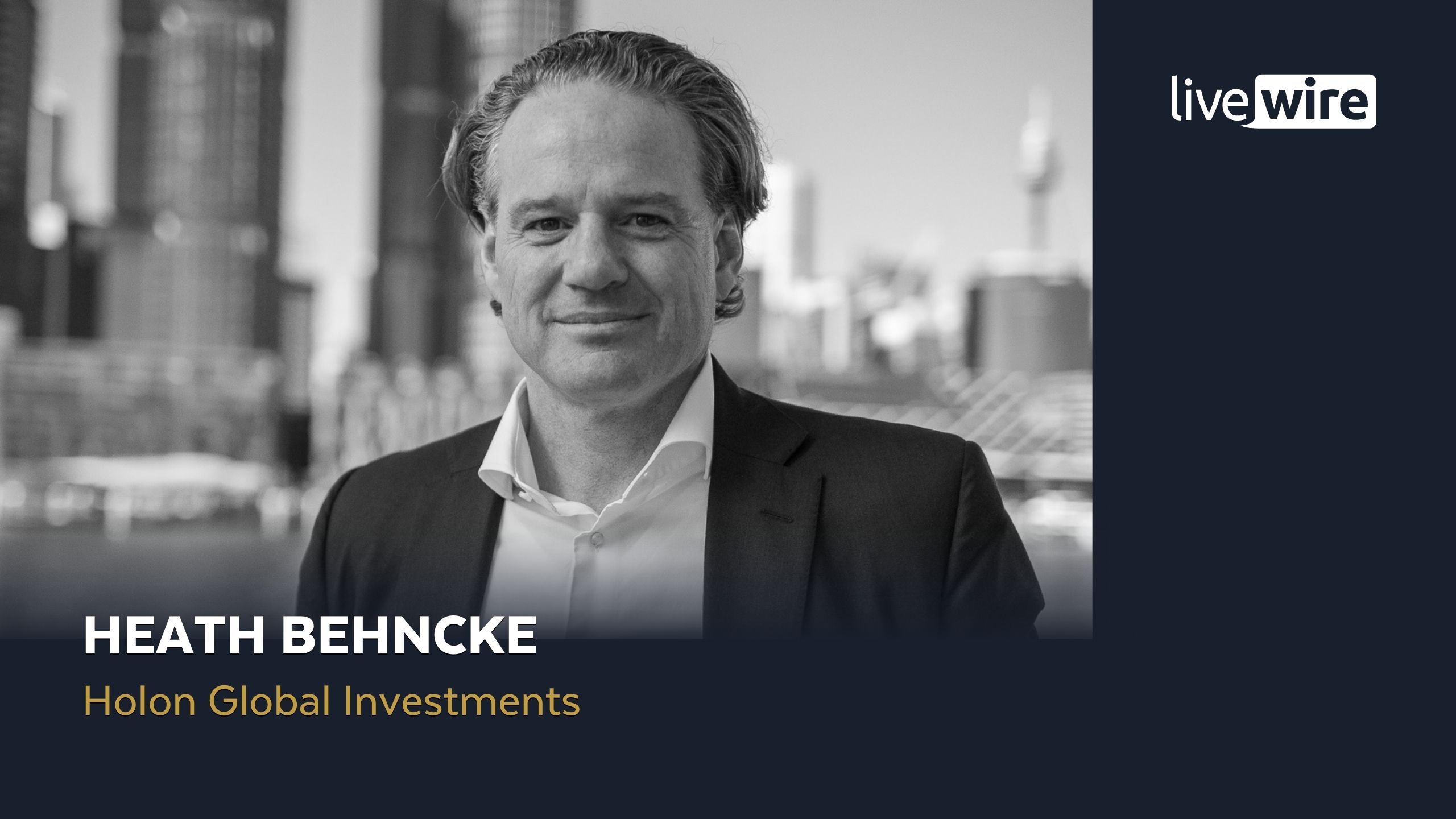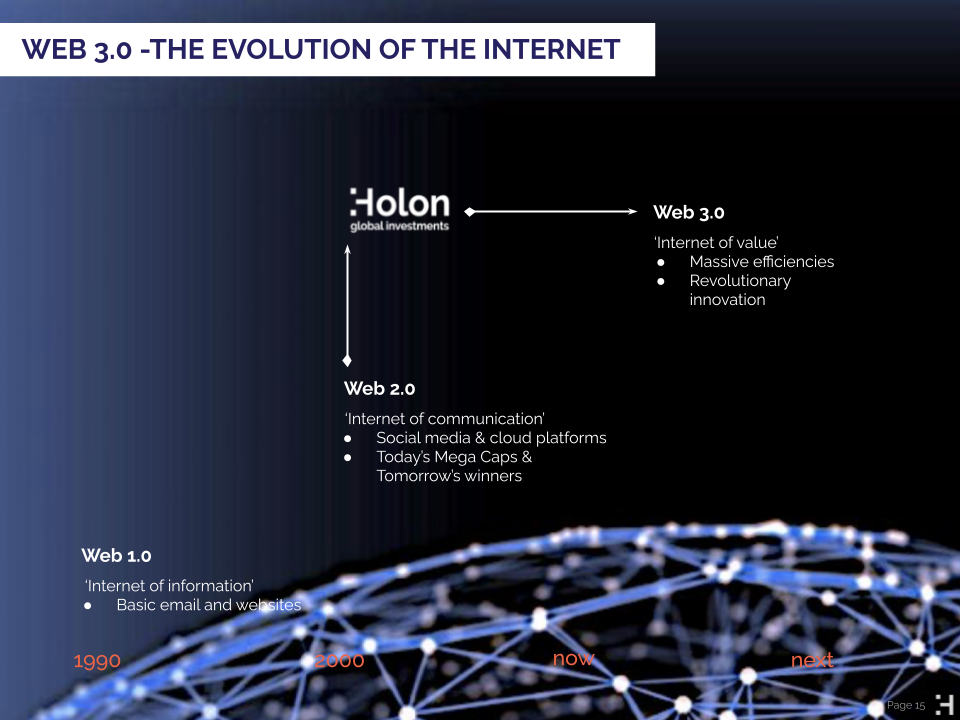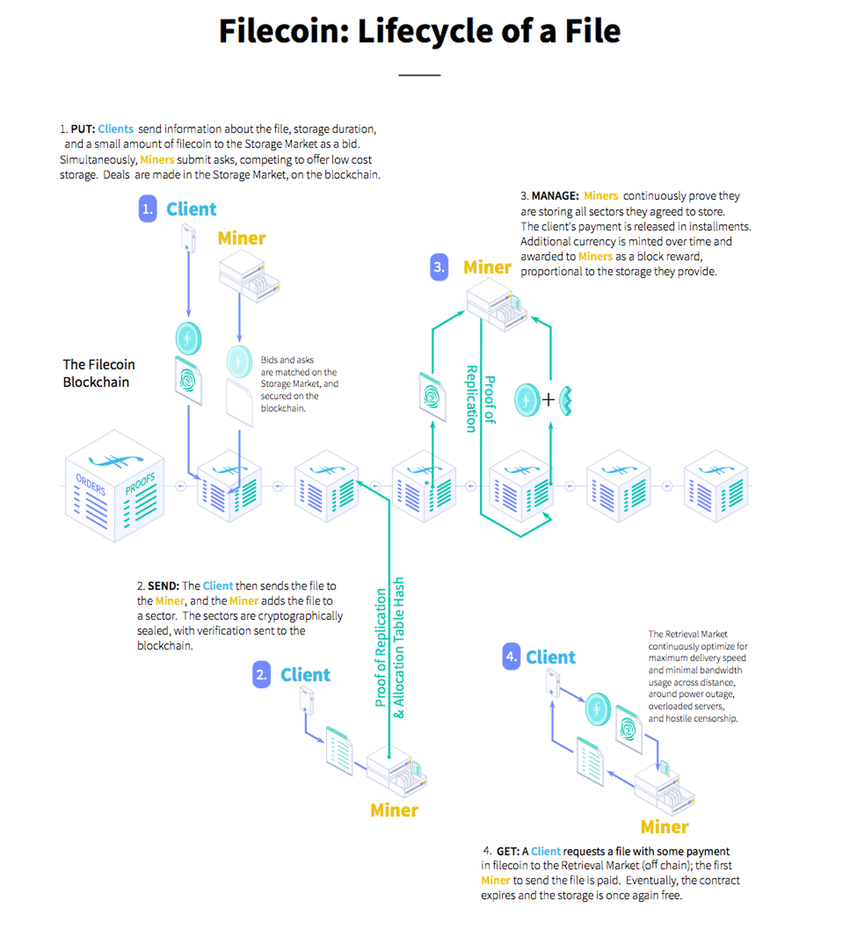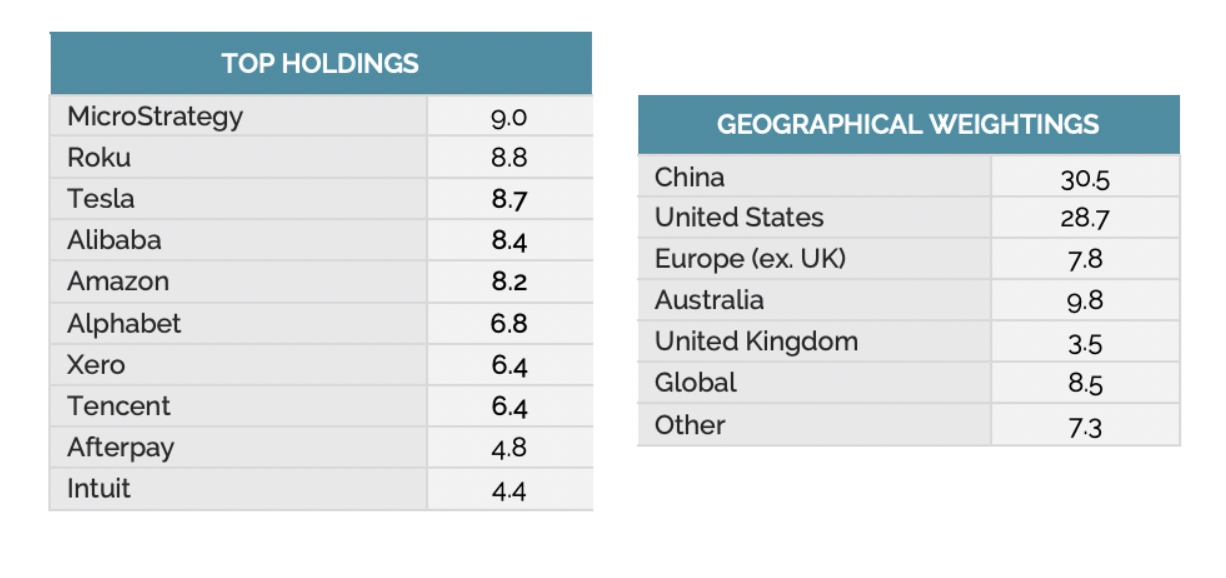From actuary to Bitcoin activist
Holon Global Investments is unlike any other Australian investment manager that I have encountered during my time at Livewire, or my years working in finance and business news.
The firm invests in the classic global leaders; the likes of Alibaba, Tesla, Amazon, Xero, Afterpay and Alphabet, to name a few, but also has a clear focus on the digital economy of tomorrow - namely, cryptocurrencies and the digital platforms that support them.
In fact, Holon's founder and managing director Heath Behncke believes that of all his investments (spanning from Asian equities, US equities, Australian equities and digital assets) Bitcoin has the most potential for upside over the coming 12 months; a prediction that I personally found surprising, to say the least.
It's a far cry from where it all started for Behncke, a former die-hard Benjamin Graham fan and Australian water polo player from Tamworth in country New South Wales, whose father and mother, small business owners, worked in the trucking industry and hairdressing, respectively.
His advice, for investors and non-investors alike, is to find something you love and do it with passion. For Behncke, this was maths, stats, and later Web 3.0.
In this profile, he highlights the potential of digital assets in the world of tomorrow. We also discuss his early education in the world of Value investing, as well as what investors (and other fund managers) are missing when they dismiss cryptocurrencies as the next major bubble.
.jpg)
A hop, skip and jump from Benjamin Graham to Bitcoin
As you may have guessed from the title of this article, Behncke started off his career with a degree in economics and actuarial studies, and soon after, a work experience stint with asset consultant Mercer.
"We started looking at fund manager returns and I realised that I actually wanted to go to that side of the fence. So the following summer, I worked with Macquarie Investment Management and that was probably the 'aha' moment when I realised this is what I want to do," Behncke recalls.
It was here, at Macquarie, that he fell down the Warren Buffett and Benjamin Graham "rabbit hole", immersing himself in all there was to know of Value investing.
"I consumed everything around Buffett, and it made a lot of sense to me because I grew up watching my parents in business; I had a very fundamental viewpoint on the world to begin with," he says.

In his early career, he worked at AMP, before jumping ship to John Murray's Perennial Value Management. He's also worked for the likes of Magellan, Credit Suisse Asset Management, and Sigma Funds Management (which he co-founded but is now shuttered).
"Since I've been in investment management, the thing that has become very clear to me is that the pace of innovation we're seeing just continues to accelerate," Behncke says.
"And I suppose this is really what confounds a lot of traditional investment managers. That's probably the biggest thing that I see, they're not actually understanding what that accelerating innovation framework is actually doing to their process."
Having worked in Australian equities during his career, Behncke soon realised he was not in the "right fishbowl" to deliver returns for investors.
He notes that the Australian equity market has returned around 8% per annum for shareholders over the past decade. In comparison, the NASDAQ has returned around 20% per annum over the same time period.
"When you start digesting it, what becomes abundantly clear is that what technologists would call Web 2.0, which is really cloud and smartphones, that's what has driven that," he says.
"And the problem is in Australia we do not have companies like that. They don't exist. We're an old-world economy, structured heavily around banks, resources and some property."
With this in mind, Behncke believes that the tech behemoths that dominate the world's major indices, the likes of Alibaba, Apple and Amazon, are the defensives of this age.
"You can see it in their balance sheet strength, which is second to none. And the ecosystems they have with hundreds of millions to billions of customers. And I think last year was a good test of that. The names which stood out, and the companies that outperformed, were these very big companies," he says.
Holon's Photon Fund portfolio is split into three buckets, the first being this "defensive" exposure making up 40-50% of the portfolio. The second "bucket" is invested in exponential global growth names like Tesla and Afterpay, which is another 40% of the portfolio; and the third bucket (around 10% of the portfolio) is invested in the technologies of the future; blockchain and the distributed ledger technologies that constitute Web 3.0.
"What you realise is that as strong as those propositions are with those big mega tech companies of Web 2.0, we also understand that they're benefiting massively from the centralization and scaling of data. And we know there's a big problem with how our data is being used," Behncke explains.
"Web 3.0 enables data to be self-sovereign, just like money is self-sovereign, and that is the decentralisation of data."

Regardless of how strong the mega-cap technology companies are today, Behncke believes they will not be able to replicate this model and predicts a structural change on the horizon for the way in which data - and money - is transferred and stored.
"From an investment perspective, we have a little bit of Bitcoin in the portfolio through MicroStrategy, which is listed in the US," he says.
"Really, that's an insurance policy on the probability that we may move to a very different financial system as we move forward. And you don't want to be sitting at zero when it does."
Just like Benjamin Graham's own journey in investing, adapting himself and his thinking to uncover undervalued opportunities, so too is a paradigm shift needed to identify and take advantage of the opportunities of tomorrow, Behncke adds.
Unravelling the web of tomorrow's digital world
When Behncke first gravitated towards cryptocurrencies and blockchain in 2016, the digital asset market was worth around $10 billion dollars. Over the past five years, this figure has ballooned to $1.9 trillion dollars.
"The conversation on cryptocurrencies is only getting started. We fully expect this to get a lot bigger. It will dwarf the Australian stock market and eventually start to rival the NASDAQ within the next 10 years," he says.
"If you're not focused on Web 3.0; if you don't understand it, you really are running a risk and you don't fully understand Web 2.0. And I say that because when you start going through how the technologists are developing Web 3.0, you learn a hell of a lot more about the underlying technology infrastructure of Web 2.0 and you realise how it was actually built and how it could potentially be disrupted."

In Behncke's mind, the central bank controlled currencies and tech giant controlled data of today will soon give way to a future that solves both the governance and ethical issues that we currently accept, some begrudgingly and others without batting an eye.
"Because we had to respond to the COVID crisis in the way we've done - central banks have printed a huge amount of money and also we have set interest rates at near-zero for all effective purposes - people start to then question what the implications of all this are and what is money," he says.
"Bitcoin really solves a governance issue with our money."
And while the mega-cap tech companies of today may not be able to replicate the decentralised system of Web 3.0, Behncke argues these companies can still utilise its infrastructure.
"The smaller ticket technology companies are already doing that today and we think those big cloud players will actually gravitate to utilising the 'Airbnb for data storage' of the Filecoin and the Filecoin network," he says.
He notes that the cost of storing data on Filecoin is currently 0.1% of what AWS charges.
"In addition to that strong value proposition, you own your data, and developers can build on that open data platform, and there's a significant cost benefit from actually doing this," Behncke says.
"And we can actually subsidise and pay people to put storage on the network. It's a very different business model than what we're used to."

The key infrastructure or protocol that we use on the internet today is HTTP, which transmits information to a location-based data centre and back to your device.
"In the IPFS world (which stores and shares data in a peer-to-peer distributed file system), we go straight to where the content is located and that actually enables a vastly more efficient internet, both in speeds and costs," Behncke says, thus shifting from an OTC market to an open market in data storage and retrieval.
"A lot of Australians in investment markets are quite familiar with this in a sense because we've done that with iron ore and coal. We are just doing this with data for the first time," he says.
There are thousands of cryptocurrencies in the world, with many coming under fire for their volatility, lack of tangible value and their often controversial "meme" names such as CUMROCKET, Shiba Inu, Loser Coin, and the now-infamous Dogecoin, which skyrocketed to public attention earlier this year.
"But in many ways, there are thousands of listed companies around the world, but only a handful of them manage to be profitable. On the ASX, for instance, there are 2,300 companies, but only the top 10% actually turn a profit," Behncke says.
"While I can't say with a hundred per cent certainty that Bitcoin will be taken up. I can say with a hundred per cent certainty that the Federal Reserve is going to have to continue printing money."
How Behncke is positioning his portfolio
Because of the large amounts of debt that has been accumulated by the world's central banks - both since the Global Financial Crisis and during the COVID-19 economic crisis - Behncke doesn't believe that we are likely to see rates lift over the coming years.
"Australia probably owes a trillion dollars post-COVID. If we got back up to a cash rate of 3% in 10 years, we would have to pay $30 billion per annum in interest," he says.
Meantime, the US has $30 trillion in debt, which Behncke believes lends itself to rates staying lower for longer.
"I feel for a lot of people because for instance, if you look at the superannuation system, 30% of funds are invested in cash and fixed income, which are at nearly 0%," he says.
"You need to accept some volatility or else you're going to have a poor retirement. I'm seeing investment managers out of the US talking about using Bitcoin as a hedge in fixed income portfolios. That's how serious the conversation is coming out of the US and Canada. And we think that it's only a matter of time before that starts to come here."
With this in mind, the Photon Fund's top holdings are MicroStrategy (NASDAQ:MSTR) - which provides Behncke's investors with exposure to Bitcoin, Roku (NASDAQ:ROKU), and Tesla (NASDAQ:TSLA), as seen below.

"When MicroStrategy put Bitcoin on the balance sheet that gave us a proxy that was safe that we could use. So we did that in December. Recently, the other position that we've added is Coinbase (NASDAQ:COIN), which we bought in April," Behncke says.
"When you look around the world, there's truly no globally scalable financial giants, because they're being tethered by their local laws and analogue systems. And then suddenly you have this infrastructure, which you can scale around and run the same service out globally. You look at Coinbase today and you can see it has the potential to be the next Facebook or Google."
As you can see from the table above, Behncke also has more than 30% exposure to China in the firm's Photon Fund. Convinced of the opportunity in the region, Holon is about to launch a China Innovation Fund over the coming months.
"There's a general concern with China when investors see what's happened with the way they've come out and approached the education sector to socialise capitalism," he says.
"But when you look at the history and ask those who've been on the ground, it's very clear. China's very capitalistic and they've benefited markedly from allowing people to make money and we don't see that changing."
In the near term, however, Behncke expects a continued conversation on promoting equality in the region - as companies like Alibaba and Tencent monopolise the business environment.
"They're stronger than their equivalents in the US because they're just so dominant. A lot of people don't realise this - Tencent's a very large company, it has a $750 billion market cap. But it also has a $250 billion investment portfolio. And Alibaba also has a very large investment portfolio as well," Behncke says.
"Over time, there's been a concern that unless you partner with either Alibaba or Tencent as a startup, you don't really get a look-in to the ecosystem in China."
And thus, China is trying to moderate the market power that these companies have, he says.
"One of the mistakes I've made in last 12 months is we're very pro-Alibaba, it is one of our biggest positions. And with the Ant IPO, we were quite excited about that business coming to market," Behncke says.
"But because Jack Ma controlled Ant Group, it's not surprising in many ways that the regulator came out saying, 'Hang on, we've got to change some things here,' because nobody controls any major financial company, individual globally. And there are good reasons for that."
While this business is being reshaped, and Tencent and Alibaba's management are working with the authorities, Behncke reminds investors that the China-US arm-wrestle for global dominance is likely to continue for another 20 years.
"It's only natural as the little brother grows up, he will start to flex his muscles. Now the little brother's not going to kneecap himself in the process of doing that," he says.
"So if the government goes really hard on these major companies, then you're going to put yourself behind on that agenda. But what they want to do is make sure they have fair competition and have lots of innovation."
He believes governance will continue to be a concern for investors in the region, however, he argues it's important to realise that capitalism functions very differently in China when compared to the US or Australia.
"Nonetheless, we think it's very much in line with their longer-term objectives. They're not going to kneecap these major companies because they need them, they just want more quality in the environment," Behncke adds.
Never miss an insight
Enjoy this wire? Hit the ‘like’ button to let us know. Stay up to date with my content by hitting the ‘follow’ button below and you’ll be notified every time I post a wire. Not already a Livewire member? Sign up today to get free access to investment ideas and strategies from Australia’s leading investors.
5 topics
2 stocks mentioned


